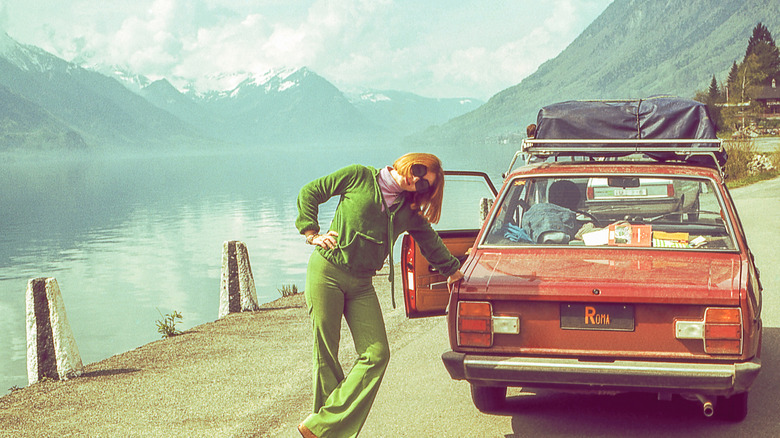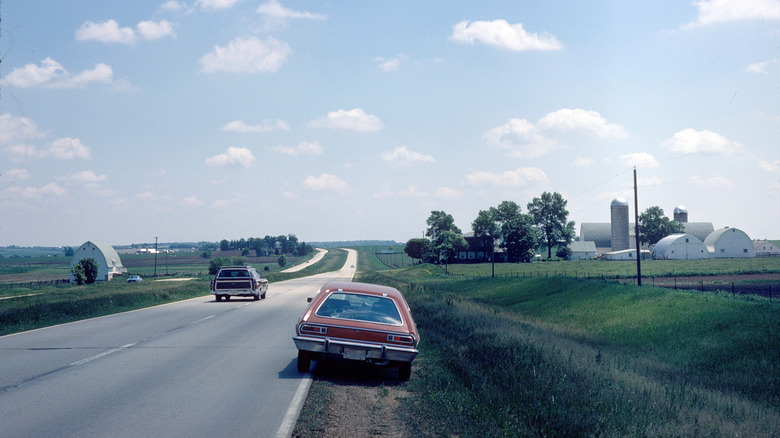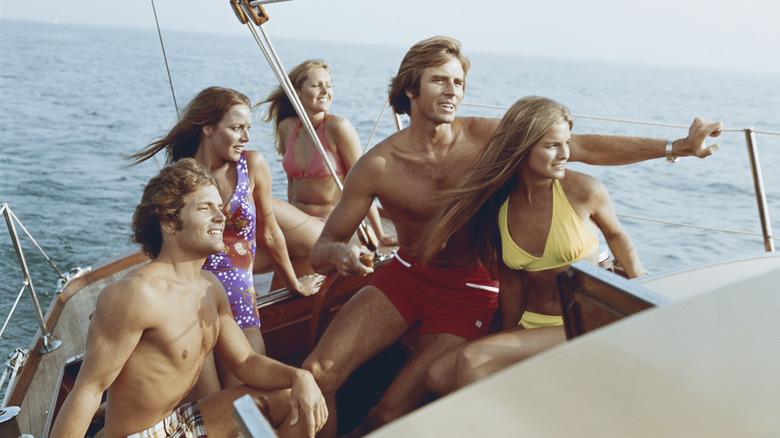Here's What 'Going On Vacation' In The 1970s Really Meant
The 1970s were a transformative decade marked by technological shifts, political upheaval, and economic decisions that shaped the modern world as we know it. So much was different about how people moved and spent leisure time just 50 years ago. It was the peak of the Hippie Trail, a legendary Europe-to-South-Asia overland route that greatly influenced Rick Steves and other backpacking pilgrims before modern international tourism evolved. Flights, especially international ones, were considered a luxury, but even if you didn't have a ticket, you could park near the runway and walk directly to the gate. Smoking indoors was permitted, and people did it everywhere, which is why you can still see built-in ashtrays on older planes.
On Reddit, users waxed nostalgic about 1970s-era travel. Most agreed that flights were typically reserved for business or emergencies. "Flying on a plane was a huge deal for us and felt very exotic," said u/travelsal11. "We didn't have much money, so we drove most of the time." With fewer annoying airport procedures and looser passenger restrictions, air travel was surprisingly permissive. Redditor u/Turicus wrote: "I was let into the cockpit during flight as a kid. Even allowed to touch the controls while the plane was on autopilot."
Of course, if you couldn't afford a plane ticket or gas for a road trip, you could still bask in the scent of travel. "When I was in High School in the '70s, we would sometimes go to O'Hare and hang out, watching the planes come and go, laugh at the Hare Krishnas trying to sell their flowers and people-watch, making up stories about the travelers," u/mothlady1959 wrote, referencing the hippie movement popularized by the Beatles. "You could park at the curb at arrivals. It was all open and accessible. And, of course, we smoked."
Road trips looked a little different
President Dwight D. Eisenhower authorized the interstate highway project in 1956, linking states via thousands of roadway miles. Though well underway in the 1970s, today's incalculable roadside gas stations, fast food chains, souvenir sales, and motels simply didn't exist to the extent they do now. "On road trips, we brought picnic baskets, and just pulled off road and sat in grass and ate our lunch," wrote one Reddit user. "Moms would mostly pack fried chicken, potato salad, and jello, and if you were rich, there'd be store-bought cookies." Another added, "We did picnics on the hood of the car. Dad even stuck a can of beans in the engine to warm them up." Many families took short trips because inflation caused gas shortages and skyrocketing prices.
As interstate travel developed, conveniences we take for granted weren't a given. Cupholders in cars were rare — so were bottled water and radios. Seatbelts, though patented in 1885, were gradually mandated: most states didn't yet require them. And although "The Green Book" had been mostly phased out as desegregation laws took firmer hold, traveling as a Black person in the U.S. still presented significant challenges. Most people on Reddit agreed there simply weren't as many people traveling back then. "I remember just getting in the car and going to the beach and getting a hotel or a campsite," reflected one. "Now you have to make reservations months and months in advance."
Photos, however, reigned supreme, although film was more expensive and carefully rationed. "I think the best part of trips was waiting for the photos to come back from the photo processing!" remembered u/travelsal11. "You had 24 to 36 pictures and it took over a week to get them back. It was like two vacations for one!"
Travel was more challenging, but in some ways, simpler
Globalization is seen in some ways as a great equalizer, although in other ways, the globalization of travel and tourism has led to environmental destruction and widened the socio-economic gap. In the 1970s, much of Europe was still behind the Iron Curtain — Americans couldn't visit even if they could afford the flight. Southeast Asia was ravaged, for much of the decade, by the Vietnam War. Tourism in Africa was regaining traction. Even popular destinations like Paris, London, and Rome didn't yet cater to tourists with mass-produced souvenirs and international chains. There was less familiarity, and fewer fellow tourists — unless you were at a major landmark like the Colosseum. Getting around meant relying on travel guides, word-of-mouth recommendations, and simply showing up to see if there was a vacancy.
Money was another hassle. Cash and traveler's checks were essential. ATMs existed but weren't widespread yet, credit cards also weren't common, and even if you had one, it was unlikely to be viable in Europe. Travelers would have to visit foreign banks frequently and sometimes get stuck when countries had long stretches of holidays (which, apparently, they often did). And of course, there were no emails or mobile phones, which made communication more complicated — or perhaps more freeing?
The inconveniences had their perks. "It felt a lot more exotic, and there was more joy of discovery," reflected u/CTThrowAway_2022. "American monoculture had not spread all over the world yet." Another agreed, sharing how they visited Bali nearly 30 years apart and concluded: "Globalization has made all these places accessible and ultimately overrun." Despite the conveniences, inclusion, and greater accessibility of modern travel, there's an undeniable sense of wistfulness for a '70s world that once felt larger, slower, and more distinct.


